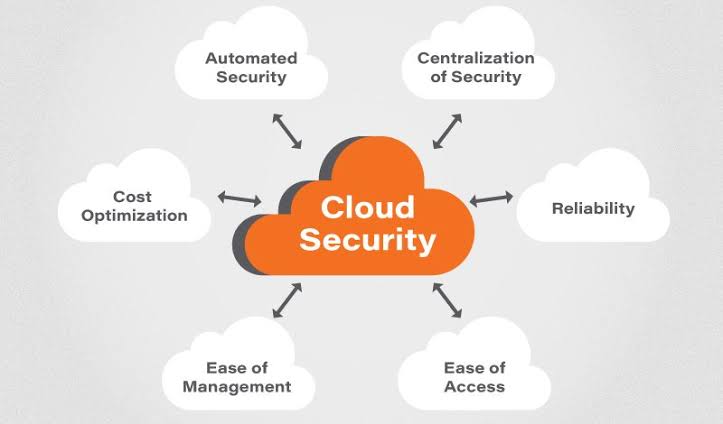Blog/Cloud Computing
Cloud Security and its importance to businesses

As Individuals entrust banks to protect their money and valuables, businesses are increasingly turning to Cloud Security as a modern-day solution for safeguarding their sensitive data. The cloud, essentially a network of servers accessed via the Internet, serves as a digital vault where businesses can securely store and protect their invaluable digital assets. Thus, understanding the fundamentals of cloud security is a key step for businesses, especially if they want to learn how it can play a pivotal role in safeguarding their business's invaluable digital assets.
Keep reading this article to discover why cloud security is essential and how it can help you transform your business, irrespective of its size.
What is Cloud Computing?
Cloud computing is a technology that delivers various computing services, such as storage, processing power, and software, on the Internet. Instead of owning and maintaining physical hardware and software, users can access and use these resources remotely through data centres operated by cloud service providers.
Cloud computing works by utilising a network of servers that are hosted in data centers. These servers can be virtualised, meaning they can run multiple instances of operating systems and applications simultaneously. Users can access these resources online via web browsers or specialised applications.
Additionally, Cloud computing offers scalability, flexibility, and cost-effectiveness, allowing users to pay for resources as they go, adjusting their usage as needed. It is also beneficial because it allows businesses and individuals to access advanced technologies and computing power without significant upfront investments.
What is Cloud Security?
Businesses are dependent on their ability to keep the data of their clients safe; therefore, they rely on a variety of measures, including encryptions, access controls, authentication mechanisms, and monitoring systems, to maintain a secure and stable cloud environment and safeguard against data breaches and unauthorised access that may pose risks to the confidentiality and integrity of information that is stored and processed on the cloud. This is where cloud security comes in.
Cloud Security refers to the policies, control mechanisms, and technologies designed to protect data associated with cloud computing structures from internal and external threats to a business's security. To achieve this, Cloud providers provide hosting services on their servers over the Internet.
Cloud Security Frameworks
Cloud security frameworks are structured guidelines designed to help organisations establish comprehensive and adequate security measures within their cloud computing environments. These frameworks provide a set of best practises, controls, and recommendations to help ensure the security of data and resources in the cloud.
They often cover various aspects of cloud security, including data protection, access management, compliance, risk assessment, and incident response. Several such frameworks exist. However, not all of these are relevant to every industry. Some of the most popular frameworks include:
Cloud Security Alliance (CSA) Cloud Controls Matrix
The CSA Cloud Controls Matrix (CCM) is a cybersecurity control framework for cloud computing, consisting of 197 control objectives organised in 17 domains covering all crucial aspects of cloud technology. It can be used to systematically evaluate a cloud implementation and recommend which actors should implement security controls within the cloud supply chain.
NIST (National Institute of Standards and Technology) Cybersecurity Framework (CSF)
This framework provides guidelines and recommendations to help organisations assess and manage security risks associated with cloud computing. It was created via an agreement between the United States government and industry as a voluntary framework to promote the protection of sensitive data. This framework is a recommended baseline for use by any organisation, irrespective of its size or the sector to which it belongs. The NIST CSF consists of three main components: Core, Implementation Tiers, and Profiles.
ISO/IEC 27001
It contains guidelines that can help clients organise a framework to manage risks related to protecting data owned and handled by the company. Although not specific to the cloud, this widely recognised framework provides a systematic approach to information security management that can be adapted to cloud environments.
CIS (Centre for Internet Security) Controls
CIS offers a set of security controls and benchmarks that can be applied to various technology platforms, including cloud environments. These benchmarks were initially aimed at on-premises systems but have also expanded to cover leading cloud provider technologies. The fact that the CIS standard was developed by a consensus of practitioners using a tried-and-true set of efficient defences in production situations contributes to its uniqueness- and has resulted in a more efficient control set.
AWS Well-Architected Cloud Framework
Cloud architects can create reliable, effective, secure, and efficient infrastructure for their applications and workloads using the AWS Well-Architected Framework. The AWS framework offers a range of design tenets and best practises for each pillar. What makes this framework different from the others is the fact that AWS has created lenses—tailored guidance for particular industrial and technological domains, such as serverless, the Internet of Things (IoT), machine learning, software as a service (SaaS), and financial sector, amongst others.
The six major pillars that make up this framework include; Cost reduction, operational excellence, performance effectiveness, reliability, security, and sustainability. These frameworks are valuable resources for organisations looking to establish a strong security foundation for their cloud deployments. They help ensure that security considerations are integrated into every stage of cloud adoption, from planning and design to implementation and ongoing management.
Types of cloud security
Cloud security can be categorised into several types:
Network Security
Focuses on securing the network infrastructure of cloud environments with tools meant to block access to and the visibility of the information contained within. These include firewalls, intrusion detection/prevention systems, and virtual private networks (VPNs).
Data Security
Involves protecting data at rest, in transit, and during processing. Encryption, access controls, and data masking are the most common techniques.
Identity and Access Management (IAM)
This helps ensure that only authorised users can access resources. It involves strong authentication methods, role-based access controls (RBAC), and multi-factor authentication (MFA).
Application Security
Protects cloud-based applications and their components from threats. This cloud involves secure coding practises, regular testing, and vulnerability assessments.
Compliance and Legal Security
Ensures cloud deployments comply with relevant legislative policies, regulations, and standards. This often involves audits and certifications.
Incident Response and Management
Establishes procedures to respond to security incidents effectively, minimising damage and reducing downtime.
Benefits of Cloud Security

Cloud security offers various benefits. They include:
Data Encryption
Cloud providers often offer strong encryption to protect your data, both in transit and at rest, helping you ensure that sensitive information remains secure and thus reducing the risk of breaches and data leaks that may cause legal issues.
Automated Security Updates
Cloud platforms regularly update their security measures and offer options for automatic software updates, reducing the burden on users to implement patches and updates to stay protected manually.
Scalability
Cloud security solutions can scale quickly to accommodate your needs, whether you are a small business or a large enterprise, without compromising security measures.
Enhanced Access Controls
Cloud security enables you to implement granular access controls, ensuring that only authorised individuals can access specific data and resources.
Threat Detection and Response
Cloud security often includes centralised monitoring and advanced threat detection tools, helping identify and respond to security incidents more effectively. Additionally, it can offer disaster recovery options to ensure business continuity in the event of data loss or breaches.
Seven Reasons why Cloud Security is Important for Businesses
As a small or large business owner, cloud security is vital for the overall credibility of your organisation, especially if you offer services that deal with data or require sensitive information from your clients. Here are seven key reasons why cloud security is important for your business:
Data Protection
Cloud security ensures that sensitive business data, such as customer information, financial records, and intellectual property, remains safe from unauthorised access, breaches, and data leaks.
Regulatory Compliance
Most industries have strict regulations governing data storage and protection. Adequate cloud security measures help businesses comply with these regulations, avoiding legal issues and hefty fines.
Business Continuity
Cloud security involves data backup and disaster recovery plans. In the case of unexpected events like cyberattacks or hardware failures, your business is not totally at a loss. With cloud security measures, you can swiftly recover your data and maintain operations without significant disruptions.
Remote Workforce
As remote work becomes more common today, cloud security allows employees to access company resources securely from different locations. This prevents unauthorised access and ensures that data remains protected regardless of where it is accessed.
Reputation and Trust
A security breach can severely damage your business's reputation and erode customer trust. However, by investing in robust cloud security, you can maintain your reputation and credibility and demonstrate your commitment to safeguarding customer information.
Cost Efficiency
It is well known that huge investments are made in security measures. Nonetheless, the costs associated with rectifying a security breach far exceed the costs of adopting cloud security solutions. Security breaches have the potential to result in unexpected financial losses. Therefore, implementing these security measures can effectively prevent unexpected losses.
Scalability and Flexibility
Cloud security solutions can be scaled up or down based on business needs. This flexibility allows your business to adapt to changes in operations and resources without compromising security, ensuring a seamless and secure transition as it grows or evolves.
Conclusion
Cloud security provides several frameworks for protecting one's data and ensuring that any hidden threats are responded to before they become full-blown problems. Therefore, it is expedient that businesses invest in the right frameworks to ensure survival and growth, despite the many tactics cybercriminals use nowadays. To learn how to go about cloud security, read our article on best practices to protect your cloud.
Related post
Recent Posts
Need help with a project?
© Wazobia Technologies 2025
Powered by:



.jpg_xZXBLo?tr=w-1500,cr-0.0.1500.840)

